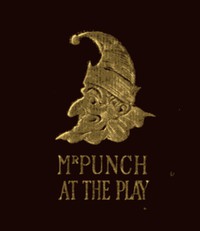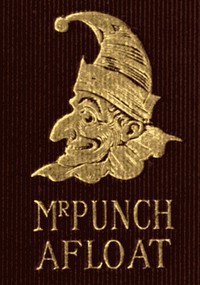Mr. Punch's Country Life: Humours of Our Rustics by J. A. Hammerton (top 100 books to read .TXT) 📗

- Author: J. A. Hammerton
Book online «Mr. Punch's Country Life: Humours of Our Rustics by J. A. Hammerton (top 100 books to read .TXT) 📗». Author J. A. Hammerton
May.—Housekeeper writes to say that eighty feet of the garden wall has been washed away.
June.—Housekeeper writes to say that the two horses, one cow, and four pigs are drowned.
July.—Go and stop in the house myself.
August.—Escape from the bedroom windows in a boat.
September.—In bed with rheumatic fever.
October.—Housekeeper writes to say that the floods are out worse than ever.
November.—Somebody writes to say that the housekeeper has been drowned.
December.—Will try and sell house in the Midland Counties.
[Pg 25]
Our Curate (who is going to describe to us his little holiday in lovely Lucerne). "My dear friends—I will not call you 'ladies and gentlemen,' since I know you too well——"
[Pg 26]
First Tramp. "Says in this 'ere paper as 'ow some of them millionaires works eight and ten hours a day, Bill."
The Philosopher. "Ah, it's a 'ard world for some poor blokes!"
A Real Convert.—Local Preacher (giving an account to the vicar of the parish of a dispute he has had with the leading lights of his sect). "Yes, sir, after treatment the likes o' that, I says to 'em, 'For the future,' says I, 'I chucks up all religion, and I goes to Church!'"
Habits of Healthy Exercise.—If a young lady is unable to sport a riding habit, she should adopt a walking habit.
[Pg 27]
The Humours of House Hunting.—Lady. "Very healthy place, is it? Have you any idea what the death-rate is here?" Caretaker. "Well, mum, I can't 'xactly zay; but it's about one apiece all round."
[Pg 28]
"'Ere y' are! All the jolly fun! Lidies' tormentors two a penny!"
[Pg 29]
The Vicar's Daughter. "I'm glad to find you've turned over a new leaf, Muggles, and don't waste your money at the public-house."
Muggles. "Yes, miss, I have it in by the barrel now, and that do come cheaper!"
[Pg 30]
TOWN THOUGHTS FROM THE COUNTRY (With the usual apologies.)Oh, to be in London now that April's there,
And whoever walks in London sees, some morning in the square,
That the upper thousands have come to town,
To the plane-trees droll in their new bark gown,
While the sparrows chirp, and the cats miaow
In London—now!
And after April, when May follows
And the black-coats come and go like swallows!
Mark, where yon fairy blossom in the Row
Leans to the rails, and canters on in clover,
Blushing and drooping, with her head bent low!
That's the wise child: she makes him ask twice over,
Lest he should think she views with too much rapture
Her first fine wealthy capture!
But,—though her path looks smooth, and though, alack!
All will be gay, till Time has painted black
The Marigold, her mother's chosen flower,—
Far brighter is my Heartsease, Love's own dower.
Mrs. Ramsbotham is staying with her niece in the country. She is much delighted with the rich colour of the spring bulbs, and says she at last understands the meaning of "as rich as Crocus."
[Pg 31]
His Bitter Half.—John. "Drink 'earty, Maria. Drink werry nigh 'arf."
[Pg 32]
HORTICULTURAL CUTTINGS (Culled by Dumb-Crambo Junior)[Pg 33]
A Conundrum to fill up a Gap in the Conversation.—Why is a person older than yourself like food for cattle?
Because he's past your age (pasturage).
Everything comes to the Man who waits.—Country Rector's Wife (engaging man-servant). And can you wait at dinner?
Man. Aw, yes, mum; I'm never that hoongry but I can wait till you've done.
[Pg 34]
Vicar. "Well, gentlemen, what can I do for you?"
Spokesman. "Please, sir, we be a deputation from farmers down Froglands parish, to ask you to pray for fine weather for t'arvest."
Vicar. "Why don't you ask your own Vicar?"
Spokesman. "Well, sir, we reckon 'e be'unt much good for this 'ere. 'E do be that fond of fishin'."
A Rustic Moralist.—Rector (going his rounds). "An uncommonly fine pig, Mr. Dibbles, I declare!"
Contemplative Villager. "Ah, yes, sir: if we was only, all of us, as fit to die as him, sir!!"
Query.—Has the want of rain this summer, and consequent failure of the hay crops, affected the market for Grass Widows?
[Pg 35]
The Boy (to Brown, who has just taken a "little place" in the Country). "Plaze, zur, wot be I to start on?"
Brown. "Oh—er—er—let's see——Oh, confound it!—er—er—make a bonfire!"
[Pg 36]
A Village Fiasco.—Gifted Amateur (concluding pet card trick). "Now, ladies and gentlemen, you have seen the pack of cards burnt before your eyes, and the ashes placed inside the box, which mysteriously transformed itself into a rabbit, which, in turn, disappeared into space. I will now ask this gentleman to name the card he selected, when it will at once appear in my hand. Now, sir, what card did you select from the pack?" Giles (who has been following the trick most intently). "Blessed if I recollect!"
[Pg 37]
Rustic (to burnt-out Farmer). "We r—r—rescued the b—b—beer zur!"
[Pg 38]
LOCAL PECULIARITIESAt Bilston they always hit the right nail on the head.
At Bolton it is impossible for those who run up ticks to bolt off.
At Broadstairs the accommodation for stout visitors is unrivalled.
At Colchester they are all "natives."
At Coventry, strange to say, they can furnish no statistics of the number of persons who have been sent there.
At Kidderminster there is certain to be something fresh on the tapis.
At Liverpool they are extremely orthodocks.
If you write to Newcastle (Staffordshire) take care to under-Lyne the address.
At Newmarket they take particular interest in the question of races.
At Portsmouth everything is ship-shape.
At Rye you will meet none but Rye faces.
At Sheffield you will always find a knife and fork laid for you.
[Pg 39]
Scene—A Pit Village. Time—Saturday Night.
Barber (to bibulous customer). "Now, sir, if you don't hold your head back, I can't shave you!"
Pitman. "A'well, hinney, just cut me hair!"
[Pg 40]
What our Architect has to put up with.—Our Architect (Spotting Sixteenth Century gables). "That's an old bit of work, my friend!"
"Oi, sir, yeu be roight, theer, that you be!"
O. A. (keen for local tradition). "You don't know exactly how old, I suppose?"
"Well, noa, sir; but old it be! Whoi, I's knowed it myself these noine years!"
Our Village Industrial Competition.—Husband (just home from the City). "My angel!—crying!—Whatever's the matter?"
Wife. "They've—awarded me—prize medal"—(sobbing)—"f' my sponge cake!"
Husband (soothingly). "And I'm quite sure it deserv——"
Wife (hysterically). "Oh—but—'t said—'twas—for the best specimen—o' concrete!"
Our Choir-master (after lamentable failure on part of Pupil). "Confound it! I thought you said you could 'Read at sight'?"
Pupil. "So I can. But not first sight."
A Truly Rural Dean.—The Dean of Ferns.
[Pg 41]
Village Worthy. "It ain't so bad for Slowcombe, mum; but, lor' bless 'ee! 'tain't nothing to what they 'ud do in London!"
[Pg 42]
Village Doctor. "And what do you intend to make of this little man, Mrs. Brisket?"
Proud Mother. "Butcher, sir. 'E's bound to be a butcher. Why, 'e 's that fond o' animals, we can 'ardly keep 'im out o' the slaughter-'ouse!"
[Pg 43]
Doctor. "Well, John, how are you to-day?"
John. "Verra bad, verra bad. I wish Providence 'ud 'ave mussy on me an' take me!"
Wife. "'Ow can you expect it to if you won't take the doctor's physic?"
[Pg 44]
Lodger. "I detect rather a disagreeable smell in the house, Mrs. Jones. Are you sure the drains——"
Welsh Landlady. "Oh, it can't be the drains, sir, whatever. There are none, sir!!"
[Pg 45]
Yorkshire Farmer (who has laid a wager—to gentleman on weighing machine). "Will ye tell us how mooch ye weigh, mister?"
Gentleman. "Well, I'm seventeen stone seven."
Farmer. "What did a' tell ye, lads? A' couldn't be wrang, for a's t' best joodge o' swine in t' coontry!"
[Pg 46]
THE SWEETS OF COUNTRY LIFE (Depicted by a Man of Feeling)'Tis sweet at Summer eve to rove,
When brightly shines each twinkling star,
And, strolling through the silent grove,
Calmly to smoke a good cigar.
'Tis sweet upon the flowery mead
To see the tender lambkins play,
With pensive eye to watch them feed,
And note how plump to roast are they.
'Tis sweet the fallow deer to view,
Couched 'mid the fern in tranquil group;
'Tis sweet to hear the turtle's coo,
And meditate on turtle soup.
'Tis sweet, from cares domestic free,
While wandering by the streamlet's side,
The speckled trout or perch to see,
And think how nice they would be, fried.
'Tis sweet to mark the plover's flight,
Lone on the moor, its nest despoiled;
And with prospective mental sight
To contemplate its eggs, hard boiled.
'Tis sweet, beside the murmuring rill,
The scented violet to smell;
Yet may a perfume sweeter still
Attend the welcome dinner-bell!
[Pg 47]
The Country in the Future.—Retired Citizen (to Metropolitan Friend). "What I enjoy so much in the country is the quiet! Now here, in my garden, my boy, you don't hear a sound, 'cepting the trains!!"
[Pg 48]
Friends in Council.—Tom Lothbury (to Jack Billiter, who has "come in" to a nice little estate in Surrey, whereunto he intends retiring and rusticating). "You'll keep cows, I s'pose, and all that sort of thing?"
Jack. "Oh, no, can't bear milk."
Tom (who has a taste for the rural). "Cocks and hens, then?"
Jack. "No, hate eggs and puddings and all that!"
Tom. "Nor yet sheep?"
Jack. "Eh, ah! Oh, yes; I'll have a sheep, I'm vewy fond of kidneys for bweakfast!"
Query.—If you give two persons a seat in a cornfield, can this proceeding be called "setting them by the ears"?
Simple, but Agricultural.—Q. What is the best time for sowing tares?
A. When the landlord goes round and collects his rents.
Fox's Martyrs.—Ducks, fowls, turkeys, and geese.
[Pg 49]
Doctor. "Well, Matthew, did you take those pills I sent you yesterday?"
Patient. "Yes, doctor; but couldn't 'e do 'em up in something different? They little boxes be terrible hard to swallow!"
[Pg 50]
On the way to the Manse.—Deacon MacTavish (to Deacon MacBrose, after visiting several hospitable houses on their way). Hoot, mon Donald, yonder's the Meenister! Noo, I'll joost tek a few paces





Comments (0)